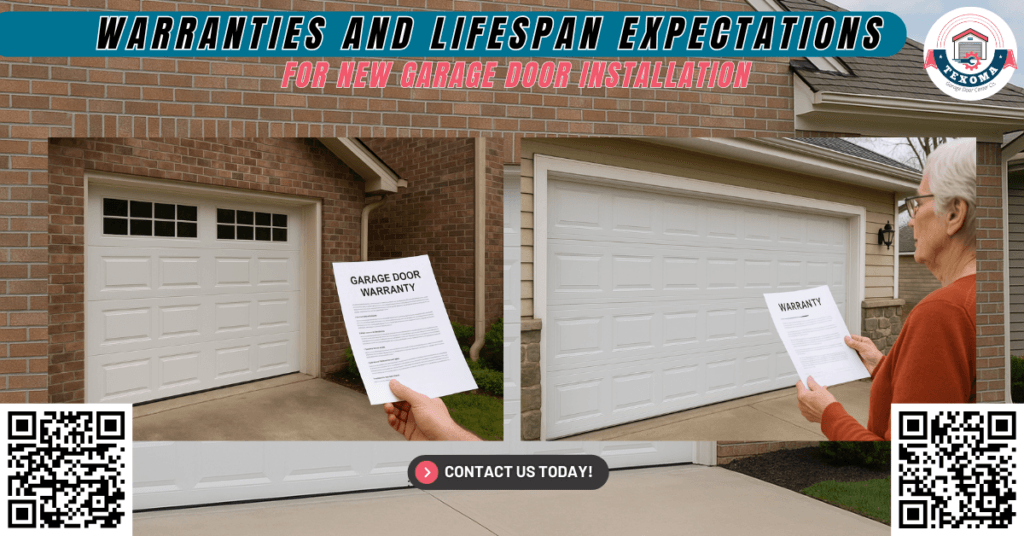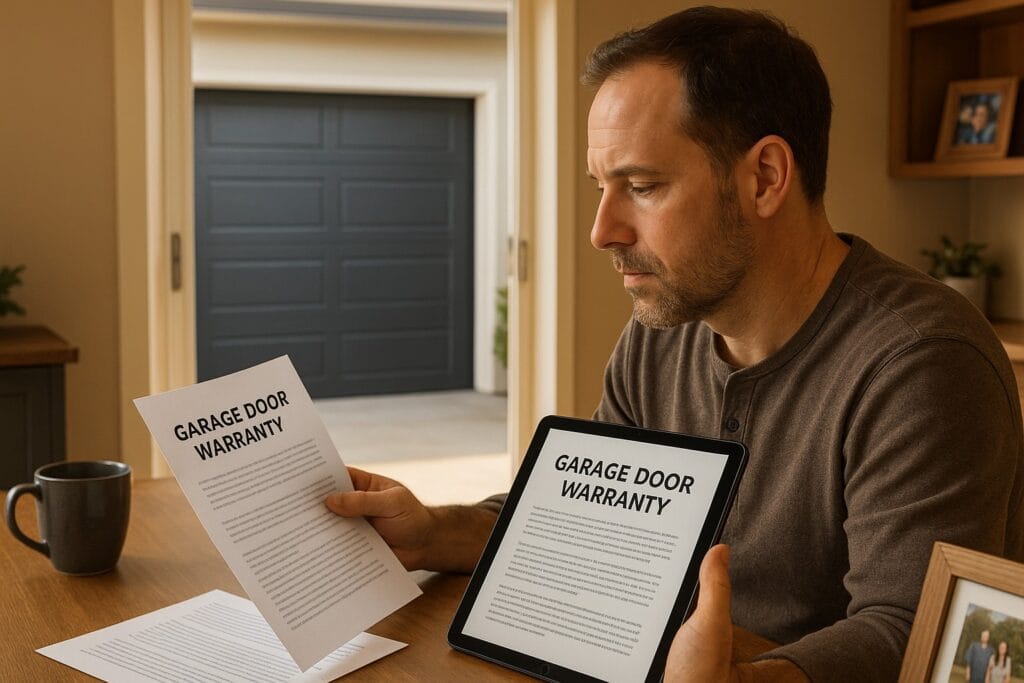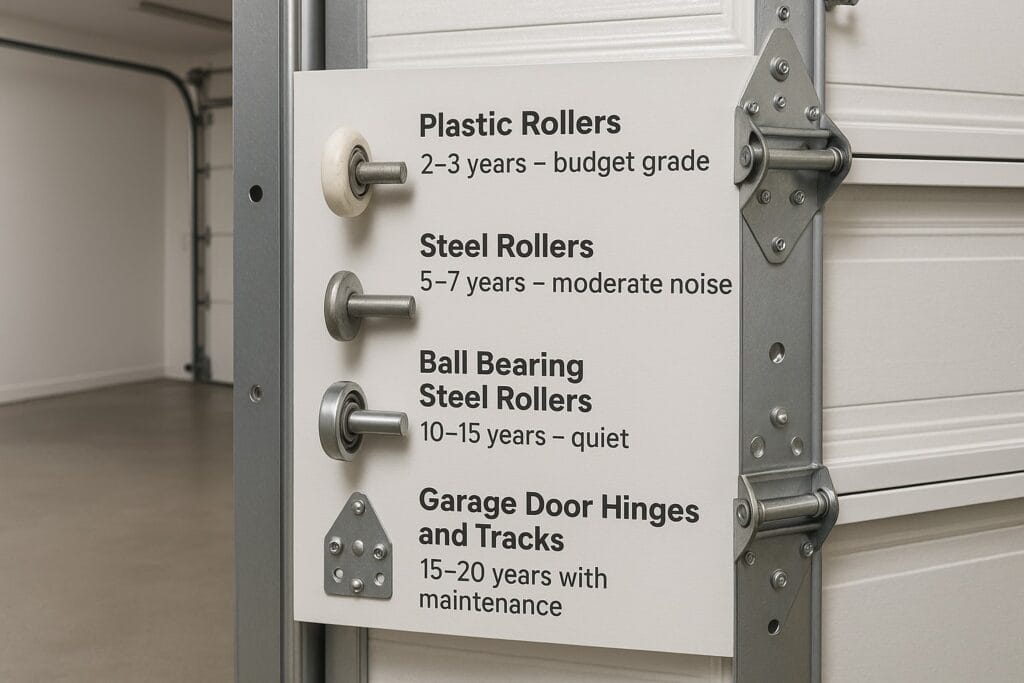Warranties and Lifespan Expectations for New Garage Door Installation

By Texoma Garage Door Center Co.
1733 Texoma Pkwy, Sherman, TX 75090 | (430) 255-5451
It was a scorching Texas afternoon when the Campbell family called us in distress. Their newly installed garage door had started making unsettling noises just two years into its service. After closer inspection, we discovered that their previous installer had used substandard materials and failed to offer any warranty protection. This case is, unfortunately, not unique. Many homeowners face similar frustrations after investing in what should have been a long-term upgrade to their house.
According to industry reports, the average garage door cycles open and shut more than 1,500 times per year. That frequent use puts substantial stress on components like torsion springs, rollers, hinges, door panels, tracks, and the garage door opener. Without proper warranty coverage or understanding of the expected lifespan of each part, homeowners could end up spending more on repairs than they anticipated. A new garage door installation, therefore, is not just a purchase; it is an investment in the long-term safety, energy efficiency, and value of your home.
At Texoma Garage Door Center Co., we believe every homeowner and business owner deserves a smooth operation and peace of mind from their garage door investment. This comprehensive guide explores the different types of warranties available, the expected lifespan of garage door components, and how maintenance, installation quality, materials, and usage patterns affect durability. Whether you’re installing a new garage door or replacing an old garage door, understanding your protection plan can make all the difference. From selecting the right garage door opener to evaluating energy-saving insulation materials, our goal is to arm you with the insights you need.
Why Understanding Warranties Matters for Your Garage Door
A new garage door installation is more than just a functional upgrade. It boosts curb appeal, enhances security, and contributes to the energy efficiency of your home. However, if the installation is not backed by a solid warranty, that investment can become a recurring expense. Warranties offer assurance that both product and labor stand up to their claims, and understanding what these warranties cover can save you time, stress, and money in the long run.

The Types of Warranties Available
- Manufacturer Warranties: These typically cover the garage door panels, hardware like hinges and tracks, and springs. Depending on the brand and type, such as steel doors or Stanley garage doors, coverage can range from 3 years to a lifetime warranty. Always ask for written documentation, and ensure the warranty applies to all parts, especially those most prone to wear.
- Labor Warranties: Provided by the installation team, labor warranties ensure that if something fails due to poor workmanship, you won’t bear the labor costs. These usually last 1 to 5 years. A good installer will provide a clear breakdown of what labor is covered and for how long.
- Opener Warranties: A separate warranty often covers the garage door opener, particularly the motor, drive carriage, sensors, and logic board. LiftMaster, Genie, and Chamberlain typically offer warranties from 5 to 10 years, depending on the model. Some higher-end models offer extended warranties, especially those equipped with smart home integration and battery backup systems.
- Finish or Paint Warranties: Many garage doors come with a finish or coating warranty, especially steel and aluminum doors. This guards against cracking, peeling, and rusting due to UV exposure and moisture, and may last 5 to 15 years. Some manufacturers offer extended warranties if certain maintenance tasks are followed, such as regular cleaning and touch-ups.
Understanding each type of warranty helps you make informed decisions about your garage door project, especially when selecting from various materials, styles, and installation options.
Lifespan Expectations: What to Know Before You Buy
The durability of your new door is shaped by many factors: material choice, usage patterns, environment, and maintenance habits. While warranties offer protection, knowing the average lifespan of each component ensures realistic expectations and planning for eventual replacements or upgrades.
1. Garage Door Panels
Garage door panels form the outer shield and design of your garage. Made from various materials like steel, wood, fiberglass, and vinyl, their lifespan varies:
- Steel panels: 20-30 years with rust prevention, weatherproof coating, and regular maintenance. Steel is durable, secure, and often used in both residential and commercial garage doors.
- Wood panels: 15-20 years, though they require more upkeep due to susceptibility to moisture, pests, and rot. Their natural appearance enhances curb appeal but may demand periodic sealing or staining.
- Vinyl and Fiberglass panels: 20+ years, with resistance to warping and corrosion. These materials are low-maintenance and ideal for humid or coastal environments.
Painted finishes, decorative hardware, and insulation levels also impact durability. Well-maintained doors not only last longer but also preserve their style and curb appeal, reducing the need for early replacement.
2. Springs (Torsion or Extension)
Garage door springs do the heavy lifting. They come in two types: torsion springs and extension springs.
- Standard springs are rated for 10,000 cycles, which equals 7–10 years for the average homeowner.
- High-cycle springs, often used in commercial or high-usage homes, last 20,000 to 25,000 cycles. These are ideal for households where the garage is used as the primary entrance.
Springs are critical to the safe operation of your garage door system. Worn or broken springs can cause a door to slam shut unexpectedly or fail to open at all. Replacing a spring is not a DIY project. It’s a job best left to professional installers for safe operation.
3. Garage Door Opener
A reliable garage door opener ensures smooth daily access. Here’s how long they typically last:
- Chain Drive and Belt Drive Openers: 10–15 years. Belt drives tend to operate more quietly, while chain drives are rugged and well-suited for heavier doors.
- Screw Drive or Direct Drive: 12–20 years with proper upkeep. Direct drive systems require fewer moving parts and are often preferred for their quiet operation and reliability.
Modern openers offer smart features such as remote access via smartphone apps, voice control, integration with home security systems, and battery backup for power outages. Upgrading your opener can improve both convenience and security.
4. Rollers, Hinges, and Tracks
- Plastic Rollers: 2–3 years, often found on budget installations, and are more prone to cracking.
- Steel Rollers (no bearings): 5–7 years with moderate noise and vibration.
- Ball Bearing Steel Rollers: 10–15 years with quiet, smooth performance, especially when properly lubricated.
- Hinges and Tracks: 15–20 years, assuming proper alignment, rust prevention, and tension balancing.

Routine maintenance, including tightening bolts, checking tracks, and lubricating hinges, can significantly delay the need for component replacement. Keeping the door frame clean and aligned also prevents premature wear.
Key Factors That Influence Lifespan
Understanding what affects your garage door’s longevity helps you protect your investment. Here are the main factors:
1. Weather in Sherman, TX
Our region’s harsh summers, unexpected freezes, and high humidity can warp, rust, or fade various garage door materials. Insulated garage doors and weather stripping are especially important here to conserve energy, stabilize interior garage temperature, and reduce energy consumption. Choosing materials suited for local climate conditions ensures long-term performance.
2. Usage Frequency
Every time you open or close your garage door, you use up one cycle. A household that enters and exits the garage 6 times per day will hit 2,000+ cycles per year. That shortens the lifespan of springs, rollers, and the garage door opener. If your garage is a frequently used entrance, consider heavy-duty or commercial-grade hardware for extended service life.
3. Installation Quality
A proper installation process done by a licensed and experienced installation team ensures optimal alignment, balance, and safety features. Incorrectly installed door panels, misaligned tracks, and poorly calibrated safety sensors can lead to operational issues and premature component failure. It also affects your eligibility for warranty protection.
4. Regular Maintenance
Scheduled inspections, cleaning, and lubrication extend the life of your door and opener. At Texoma Garage Door Center Co., we recommend a maintenance plan that includes annual inspections, spring tension checks, and sensor testing. Documented upkeep is often required to maintain warranty validity and prevent costly repairs.
Warranty Exclusions: What’s Not Covered
Even a good warranty has limitations. Most exclude the following:
- Damage from misuse or accidents (e.g., vehicle impacts or overloading the opener)
- Acts of God (hail, floods, high winds)
- Neglect (failure to perform regular maintenance)
- Cosmetic wear (scratches, fading)
- Unauthorized repairs (DIY or uncertified technician work)
Always read the fine print and understand your responsibilities as a homeowner to preserve your warranty.
Questions You Should Ask Before Installation
To ensure clarity and protect your investment, ask these before signing the contract:
- What parts are covered and for how long?
- Does the warranty include labor?
- Are there any maintenance requirements?
- Is the warranty transferable if I sell my home?
- Who handles warranty service, the installer or the manufacturer?
- Are there exclusions for specific types of damage or usage?
- What voids the warranty?
With us, the answers are always transparent. We back all our garage door installations with dependable coverage, detailed documentation, and excellent customer support.
Benefits of Hiring a Professional Installer
Going with a professional like Texoma Garage Door Center Co. ensures more than just quality work:
- Proper alignment of door panels, track systems, and springs
- Full safety sensor testing and calibration
- Efficient connection of garage door opener, including screw drive carriage
- Bottom panel sealing for improved insulation and moisture resistance
- Clean removal and responsible disposal of your old garage door
A proper installation also ensures you comply with local building codes, supports safe operation, and protects your warranty eligibility. A reputable installer also guides design, features, and materials that best fit your home and usage needs.
Real Case Study: Upgraded Install with Long-Term Warranty
We recently completed a garage door installation for a business in downtown Sherman. The project included:
- Insulated steel doors with R-values exceeding local energy codes
- High-cycle torsion springs rated for over 25,000 cycles
- A powerlift opener with smartphone remote access and backup power
- Extended labor warranty and comprehensive manufacturer coverage
Thanks to regular service calls from our team, the client has enjoyed three trouble-free years with no breakdowns or major service costs. This project proves the importance of choosing the right door, the right installer, and a dependable warranty plan for long-term satisfaction.
Maintenance Tips to Extend the Life of Your Garage Door
- Lubricate all moving parts every 6 months (rollers, hinges, springs)
- Inspect the tracks for alignment and obstructions
- Clean dirt and debris from the door panels and door frame
- Test the garage door opener and safety sensors monthly
- Tighten all hardware, including bolts and brackets, quarterly
- Check insulation and weather stripping annually
- Replace worn cables, frayed wires, and damaged rollers promptly
With these habits, you ensure smooth operation, lower energy costs, and avoid costly repairs or premature replacement.
How Can Texoma Garage Door Center Co. Help You?
At Texoma Garage Door Center Co., we offer:
- Expert consultation to select the right garage door for your home or business
- A wide range of materials, styles, and features to fit your budget and taste
- Professional garage door installation backed by labor and product warranties
- Flexible maintenance plans to keep your garage doors working safely
- Emergency repairs and 24/7 availability when you need help the most
- Transparent pricing and guidance through every step of your project
We proudly serve Sherman, TX, and surrounding areas with top-tier customer service and craftsmanship. Every project, from garage door replacement to full new garage door installation, is treated with care, precision, and pride.
Contact us today!
📍 Visit: 1733 Texoma Pkwy, Sherman, TX 75090
📞 Call: (430) 255-5451
Let us help you choose the perfect garage door, backed by dependable warranties and built to last for decades. When it comes to quality, safety, and style, trust Texoma Garage Door Center Co.
Stay tuned to our blog for more tips, seasonal guides, and garage door industry insights tailored for Sherman homeowners and businesses.
Frequently Asked Questions (FAQs)
1. Can I upgrade my garage door insulation after installation?
Yes, insulation kits are available for retrofit, allowing you to enhance your existing garage door’s energy efficiency without replacing the entire system.
2. What happens if my garage door opener starts making noise but still works?
Unusual noise is often an early sign of worn rollers, loose hardware, or a failing drive system; it’s best to have it inspected before further damage occurs.
3. Are warranties still valid if I perform minor DIY maintenance?
Most warranties remain valid if maintenance is limited to basic upkeep like cleaning and lubricating, and avoid any structural or electrical work unless done by a pro.
4. How long does a typical garage door installation take?
Standard installations generally take 3 to 6 hours, depending on the type of door, opener, and whether the old door needs to be removed.
